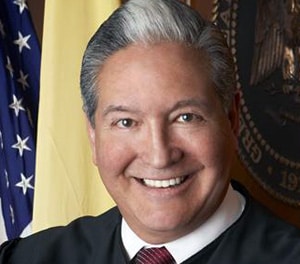
Robert E. Robles
Appellate Judge Robert E. Robles says people should consider three things when deciding how to vote in judicial races: experience, qualifications and ethics.
And Robles, a former district judge in Doña Ana County who was appointed to the Court of Appeals in 2008, says he has all three. The Democrat is facing a challenge on Nov. 2 from Republican Ned Fuller.
Appellate judges who are appointed must face one partisan election. After that, if they’re elected, they run for retention without an opponent.
The appeals court handles cases related to all areas of law, so Robles said it’s important to select judges who have experience in all areas of law. He spent 13 years as a general-practice lawyer before becoming a district judge in 1991. He was primarily assigned civil cases on that court, but also handled others when other judges recused themselves.
That wide range of experience, Robles said, “has made the transition” to the appeals court “one where I could hit the ground running, which is important.”
Robles said the appeals court hasn’t moved as quickly on cases as it should have in the past, but he’s working to reduce the case backlog. He said he’s put out 40-50 opinions since he joined the court.
As for qualifications, Robles said that’s different than experience. By qualifications, he means that an independent, bipartisan panel of lawyers has reviewed his record, dug into his past, had the opportunity to vet him for the position he currently holds – and for a spot on the Supreme Court – and found him to be qualified for both.
Robles was one of six applicants recommended by a judicial nominating commission for a spot on the Supreme Court in 2007, but the governor didn’t appoint him. He applied for and received the appeals court position the next year.
Those commissions do extensive background checks that include consideration of any complaints to the state’s judicial and attorney ethics boards and any lawsuits filed against applicants.
“I’m pleased to say that, having gone through that process, there were no complaints,” Robles said.
As for ethics, Robles said judges get on the front page of the newspaper for one of two reasons: Either “they did something really, really bad” or they are presiding over a high-profile case.
“Having lived in that glass house for 20 years, I’m happy to say that I’ve only been on the front page because I was involved in a case of significance,” Robles said.
Focused on being an appeals judge
I asked Robles if he’s still aiming to serve on the Supreme Court. He noted that following the non-partisan nomination process, the selection of Supreme Court justices “gets a little political” because the governor makes the final decision. But he said he’s “learned never to say never.”
“I can tell you right now my focus is to be elected to the Court of Appeals and to help process appeals and to be the best judge I can be,” Robles said. “Who knows what the future holds.”
Robles said he believes he’s contributing something “that is perhaps more significant to the state as a whole” than he did as a district judge. When a judge rules on a case in district court, he’s ruling on that case. But when an appeals court panel rules on an appeal, it’s establishing case law for all the district courts in the state.
Robles said he believes he has brought a “broader perspective” to the court. He’s one of two appeals judges from outside the Albuquerque/Santa Fe area. There are no justices on the Supreme Court from outside Albuquerque and Santa Fe.
Robles was born in Albuquerque and lived out of the state during much of his childhood, but he returned to New Mexico for college and law school and lived in Las Cruces for 30 years – more than he’s ever lived any other place in his life. He now lives and works in Albuquerque.
Robles said he certainly believes the law should be applied the same no matter where you’re from, but said judges also bring their life experiences to the job, so it’s important to have regional diversity on the court.
“Not everybody is made with one stamp,” he said.